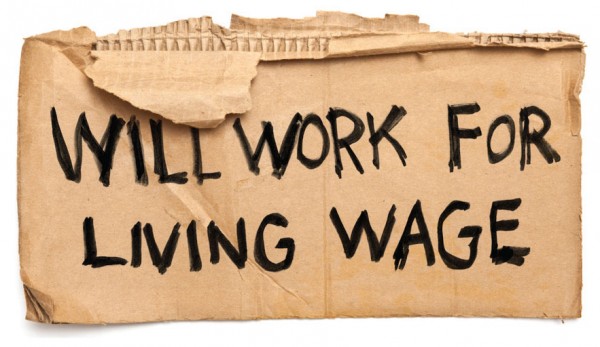Throughout the nation a movement has been fomenting around the need for a living wage. Thousands of workers have gone on strike, politicians have stumped, and large companies such as McDonalds and Walmart have given token raises; but little has been done in Florida to make a living wage a reality. In Alachua County a coalition of religious organizations, businesses, labor unions, and economic justice activists have come together to make a tangible change for Alachua County workers. Our ambitious goal is to have the 10 largest employers in the County pay a Living Wage by 2020. We aim to enforce Article X, Section 24 of the Florida Constitution which is currently being scorned by many of our elected officials.
All working Floridians are entitled to be paid a minimum wage that is sufficient to provide a decent and healthy life for them and their families, that protects their employers from unfair low-wage competition, and that does not force them to rely on taxpayer-funded public services in order to avoid economic hardship.
Poverty is the inability to pay for all of life’s necessities without the use of public subsidies or private charities. In Alachua County there are an estimated 61,000 people living under the federal poverty threshold. This represents roughly 26% of all residents, including 1 in 4 children. As a society we decided long ago that we will not allow people to starve, go without emergency health care, ignore the early education of any child, or forgo the necessities of life for anyone who cannot afford them due to disability or low wages.
Most of the families who use government assistance are the working poor. Nearly 7 in 10 households in Alachua County who received Food Stamps/SNAP had 1 or more workers in the past 12 months. This is unsurprising when a whopping 75% of the labor force currently living in poverty is employed. While unemployment is a major contributing factor to poverty, even once a job is found it’s often not enough to make ends meet. Census data estimates that in Alachua County alone it would take over $74 million for those below the poverty threshold to overcome their income deficit and meet their basic needs without outside help.
The campaign for a living wage seeks to address the concerns of the working poor by ensuring that all workers can live a dignified life by earning a living wage. In doing so, thousands of workers will be lifted out of poverty and taxpayers will save millions in public assistance to subsidize these artificially low wages.
Achieving a living wage for the 10 largest employers in Alachua County will require varying tactics, strategies, and constant reevaluation. As of July 2015, the City of Gainesville has a Living Wage Ordinance that sets the minimum wage at 100% of the Federal Poverty Level, currently at $11.66 an hour. However, there are numerous loopholes that allow contractors to avoid paying the mandated living wage. We seek to address these loopholes directly and fully in 2016. The current focus of the living wage campaign is for the County Commission to pass a living wage ordinance for their workforce and those they contract with.
The lowest wage paid to County employees is $10.22/hour. Although this is more than Florida’s minimum wage of $8.05/hour, it is still well below the current Federal Poverty Level. The issue of low wages for county workers is so severe that in 2013, 6% of County employees fell within 10% of that level and qualified for government assistance programs.
The Coalition’s proposed ordinance, to be phased in gradually over six years, sets a living wage standard of 125% above the FPL for a family of four. Today, 125% of the poverty level would mean a starting wage of $14.57 an hour. Once fully implemented in Alachua County, the living wage ordinance would lift 128 workers and their families out of poverty and increase direct local consumer spending by over $700 thousand (source).
This proposed living wage ordinance would benefit the entire county by bolstering the economy and tax base and rendering thousands in government subsidies unnecessary, all while funneling millions of dollars in revenues to businesses and service providers throughout the County.
To find out more about the Alachua County Living Wage campaign, including information on how to get involved and links to the sources used please visit http://laborcoalition.org/living-wage-campaign/.


